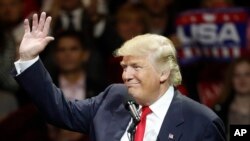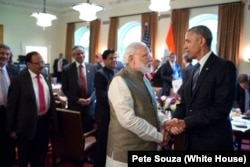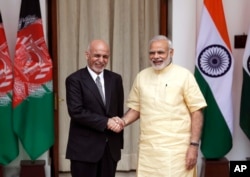On the campaign trail this year, Donald Trump had harsh words for Pakistan.
“These are not friends of ours,” Trump the candidate said at one point, referring to Pakistan and China. “And we’re going to probably have to deal with them a lot differently than we thought.”
President-elect Trump expressed a much different view this week.
During a congratulatory phone conversation, Trump called Pakistan Prime Minister Nawaz Sharif “a terrific guy” with a “very good reputation” who is “doing amazing work.”
This is a nuclear-armed U.S. ally that has repeatedly thwarted U.S. aims in the region despite taking in billions of dollars in American aid over the past two decades. Though it has taken on militant groups on its soil, Pakistan has resisted calls to halt its support of insurgent groups fighting the U.S.-backed government in Afghanistan. Relations have soured under President Obama as Washington has deepened its engagement with Pakistan's arch rival, India.
“For Washington, there is a sense of frustration that after it’s provided so much aid and arms to the Pakistani military, the country continues to provide sanctuary to terrorists that target the United States,” said Michael Kugelman of the Wilson Center in Washington.
Trump is known for not sticking to a script when he speaks. His impromptu remarks were a signature part of his successful presidential campaign and in line with his pledge to build new relationships with world leaders. But when it comes to foreign policy, analysts say consequences from a gaffe or misinterpretation – by allies and adversaries alike -- can be severe. In a region marked by age-old rivalries, a statement by the American president can be misconstrued as a shift in the country's strategic alignments.
“It could lead them to draw conclusions which I think would be unwarranted And then follows the let down,” said Marvin Weinbaum, a former State Department analyst for Afghanistan and Pakistan now with the Middle East Institute in Washington.
With Pakistan long wary of the increasingly warm U.S. relations with India, Trump’s flattering remarks came as a surprise that Islamabad apparently couldn't resist publicly reporting.
So effusive was Trump in his praise of Sharif that “understandably Pakistan recognized here that it had a gold piece handed to it from the president,” Weinbaum said.
According to a 200-word summary of the Wednesday phone call between Trump and Sharif released by the Pakistani prime minister’s office, the president-elect called Pakistan “amazing with tremendous opportunities.”
"Pakistanis are one of the most intelligent people," Trump reportedly told Sharif.
And when Sharif invited Trump to visit Pakistan, Trump reportedly responded that “he would love to come to a fantastic country, fantastic place of fantastic people.”
The release of a near-verbatim read-out of the call, which appeared to relay direct quotes from the conversation, drew sharp criticism for its apparent breach of a long-standing diplomatic practice to announce such calls in intentionally bland language.
The Pakistani prime minister’s office hasn’t responded to the criticism. Trump’s transition team released a statement about the phone call but did not confirm or deny the Pakistani version.
Rethinking Leader Phone Calls?
Since the U.S. presidential election, Trump and his vice president, Mike Pence, have received more than 50 congratulatory calls from world leaders, including Indian prime minister Narendra Modi and Afghan President Ashraf Ghani. Sharif was not the only foreign leader to report words of praise from the incoming American president. Trump reportedly told Kazakhstan’s authoritarian president, Nursultan Nazarbayev, that under his leadership Kazakhstan “had achieved fantastic success that can be called a ‘miracle’” and expressed a desire to visit the country, according to a statement on the Kazak leader’s website.
The fallout from Trump's off the cuff remarks to world leaders may lead his advisors to bring a greater measure of discipline to his international contacts, Weinbaum said.
“I think there will be immediately a rethinking of how he’s handling these kinds of conversations,” he said.
A Trump transition team spokesperson didn’t respond to a request for comment
Reactions in Washington and in the region to Trump’s unscripted conversation with the Pakistani prime minister ranged from bemusement to skepticism to incredulity.
James Cunningham, a retired American diplomat who served as Ambassador to Afghanistan and Israel, said he was surprised by the Pakistani decision to release details of the phone call.
“Usually, it’s, if they say anything, a confirmation that they spoke,” Cunningham said.
Others were left agape.
“When I first heard about it, I thought it was a joke,” said Kugelman, who writes regularly about Pakistan. “I couldn’t believe this conversation happened.”
But on closer examination, he said he could not help but detect Trump’s voice in the transcript and conclude that the statement was authentic.
“Cleary, it happened,” Kugelman said. “The conversation was positive. Perhaps the Pakistani decided to go one extra step in this case and make things a little less typical by trying to be more detailed in capturing this idea of a deep camaraderie between Trump and Sharif.”
Trump’s business interests in India have played into Pakistani fears that Trump will carry on the Obama Administration’s tilt towards India, experts said. Just days after the election, Trump met with three Indian business partners building a Trump Tower outside Mumbai, stoking criticism about the potential conflicts of interest arising from his global business operations.
Trump reported income of between $1 million and $5 million from each of his two Indian licensing deals, according to his latest financial disclosure form.
Others voiced skepticism about the statement’s veracity but many took the words at face value.
In both India and Afghanistan, “for those that accepted it, there would be a lot of concern,” Kugelman said.
Of particular concern to many in India was Trump’s offer to Sharif to “play any role that you want me to play to address and find solutions to the outstanding problems” – which some read as an apparent allusion to the decades-old feud between Pakistan and India.
The two neighhors have gone to war three times over the past 70 years over the disputed Kashmir region. Pakistan has long called for international mediation but India sees the dispute as a closed case.
“An open ended offer like that from the U.S. president to the prime minister of Pakistan would be seen as an alarm in India where there is all kinds of concern already that the U.S. relationship with Pakistan is too strong,” Kugelman said.
In Afghanistan, too, “anything that suggests that the U.S. sees things Pakistan’s way is viewed as a strong negative,” Weinbaum said.
But Cunningham played down the phone call’s policy implications.
“These initial contacts are just that: initial contacts,” Cunningham said. “I don’t think there is any particular shift or sign or indication in that first contact about what later discussions will be like.”







